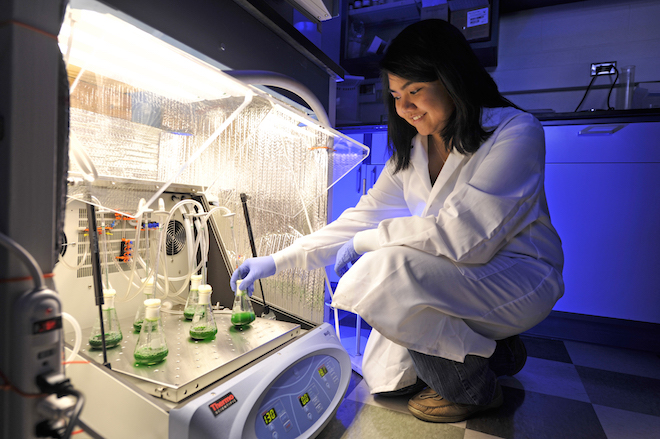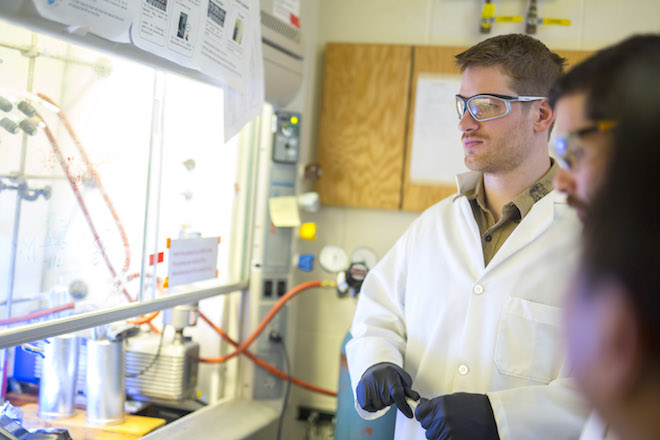
Even as an undergraduate majoring in chemical engineering, Lara Jazmin, PhD’15, had a deep interest in applying math and science to real-world problems. She found a golden opportunity to do just that as a graduate student when she started working in the laboratory of Jamey Young, associate professor of chemical and biomolecular engineering at Vanderbilt.
About 10 years ago, Young’s research mapping the metabolic pathways within living cells began generating a lot of interest from pharmaceutical and biotechnology companies.
The use of cells as microfactories to produce food, drugs and fuels has a long history. Researchers traditionally have treated cells as tiny black boxes, studying what goes into cells and what comes out, but there was very little information about what was happening inside.
“Our research has given us a technology that reveals what’s going on within cells,” said Jazmin. “It is similar to the information that X-rays provide about what is going on within the body. By mapping the pathways of biochemical reactions within cells, it gives researchers detailed information they can use to bioengineer microorganisms to improve the efficiency and reduce the cost of producing drugs, biofuels, perfumes and a wide-range of other products.”
In 2015, Jazmin and Young founded the company Metalytics to commercialize the technology with the aid of The Innovation Corps (I-Corps™), a National Science Foundation program that helps researchers learn what is involved in turning their NSF-funded research into commercial products. The program is part of a national effort to encourage innovation and drive economic development.
“The idea to start a company came before I-Corps, but I think the contacts we made and the lessons we learned through the I-Corps program gave us the confidence to pull the trigger,” said Young. “I-Corps forced us to make a ‘go or no go’ decision and provided us with a path forward.”
Jazmin and Young are one of seven Vanderbilt teams—each composed of a faculty member, entrepreneurial lead and business mentor—who have gone through the six-week I-Corps program. Four of the teams decided to form companies and create commercial products based on their ideas. Another five teams have been invited to participate, and an additional 18 have expressed interest.
Last year the Wond’ry, the university’s center for innovation and entrepreneurship, in collaboration with the Vanderbilt Institute in Surgery and Engineering, won a five-year, $500,000 NSF grant to become an I-Corps site. The designation puts Vanderbilt in elite company and allows the university to teach some I-Corps courses on commercialization. It also gives participants small grants to support their initial entrepreneurial efforts and works hand-in-glove with the Center for Technology Transfer & Commercialization, which provides professional commercialization services to the Vanderbilt community.
“What’s really great about the program is that it forces the researchers to get out of the lab and talk to people—to business students, angel investors, industry representatives—and this helps them identify the ‘value-added’ aspects of their research … in addition to the cool science that they report in academic papers,” said I-Corps site coordinator Byron Smith, MS’12, who has been involved in a number of projects. “It also puts them in touch with the extensive local and national accelerator network that can kick-start their commercialization efforts.”
Smith was the entrepreneurial lead on the first team at Vanderbilt to go through the I-Corps program. He formed a company to develop a disposable CO2 system for inflating the colon during colonoscopies, so the doctors could view the areas between the folds. Although the system would reduce pain and shorten recovery times, it turned out to be more expensive than existing systems.
“Although it didn’t work out, the experience gave me a thorough understanding of the commercialization process and the tools you need to succeed,” Smith said. “No matter how great a discovery is, if it’s not profitable it’s not going to help patients.”

Another company that benefited from I-Corps is VenoStent. Founded by Vanderbilt graduate students Timothy Boire, MS’13, PhD’17, and Geoffrey Lucks, MBA’17, it is applying shape-memory polymers to reduce failures of hemodialysis access sites, the main technique used to remove wastes from dialysis patients’ blood. According to the latest statistics there are approximately 468,000 dialysis patients in the U.S. Access site failures are a major cause of mortality and morbidity, with 40–60 percent failing within the first year.
Boire had experience working for Genzyme, a large biotechnology company, before deciding to go back to school and get his Ph.D. with the idea of starting a company. Working in with biomedical engineering faculty, Boire developed a new class of biocompatible polymers with a remarkable quality: They can retain their shape at body temperature.
In collaboration with Vanderbilt Professor of Surgery Colleen Brophy, Boire and his colleagues determined that the material could be molded into a wrap and applied externally to vein-artery or vein-graft junctions. Initial testing in mice showed that these wraps could promote new blood vessel formation, which, in combination with the mechanical support that it provides, may suppress a biochemical reaction called neointimal hyperplasia, which is one of the major causes of access site failures.
“At first, we were thinking about applying it to heart bypass surgery,” said Boire. “In the course of the interviews with vascular surgeons that we conducted as part of the I-Corps program, however, we shifted our focus to dialysis when we learned that the clinical need was even more acute and the clinical trial and follow-up times are far shorter.”
Recently, VenoStent has been accepted into the J-Labs program, a biotechnology startup incubator in Houston sponsored by Johnson & Johnson Co. It is designed to provide entrepreneurs with promising new medical technologies with a “resource-rich environment” to help them successfully commercialize their ideas.
Select Vanderbilt I-Corps Grants
- Vanderbilt University I-Corps Site
Principal Investigator: Robert Grajewski; Co-Principal Investigator: Robert Webster; Start Date: 08/15/2017; Award Amount: $99,937.00; - Ultra Minimally Invasive Surgical Tools
Principal Investigator: Robert Webster; Co-Principal Investigator; Start Date: 08/15/2016; Award Amount: $50,000.00; - Barcode embedded rapid diagnostic tests for point-of-care fertility tests
Principal Investigator: David Wright; Start Date: 01/01/2018; Award Amount: $50,000.00; - A modular toolkit for rapid prototyping of capsule robots
Principal Investigator: Pietro Valdastri; Co-Principal Investigators: Christopher Harris, Ekawahyu Susilo; Start Date: 12/15/2014; Award Amount: $50,000.00; - Discovery for a Semi-Powered Transtibial Prosthesis
Principal Investigator: Michael Goldfarb; Start Date: 04/01/2018; Award Amount: $50,000.00; - Software and Services to Enable Metabolic Flux Analysis
Principal Investigator: Jamey Young; Start Date: 05/15/2015; Award Amount: $50,000.00; - CO2 Insufflator for Minimally Invasive Procedures
Principal Investigator: Pietro Valdastri; Start Date: 10/01/2013; Award Amount: $50,000.00; - Filtergraph – A fast and intuitive data visualization interface for massive datasets
Principal Investigator: Keivan Stassun; Start Date:07/01/2014; Award Amount: $50,000.00. - A Shape Memory External Stent for Vein Graft
Principal Investigator: Hak-Joon Sung (no longer at Vanderbilt), with Timothy Boire, MS’13, PhD’17; Start Date: 08/01/2014; Award Amount: $50,000.00; - A Community-Driven Precision GPS Service
Principal Investigator: Akos Ledeczi; Start Date: 07/01/2014; Award Amount: $50,000.00.